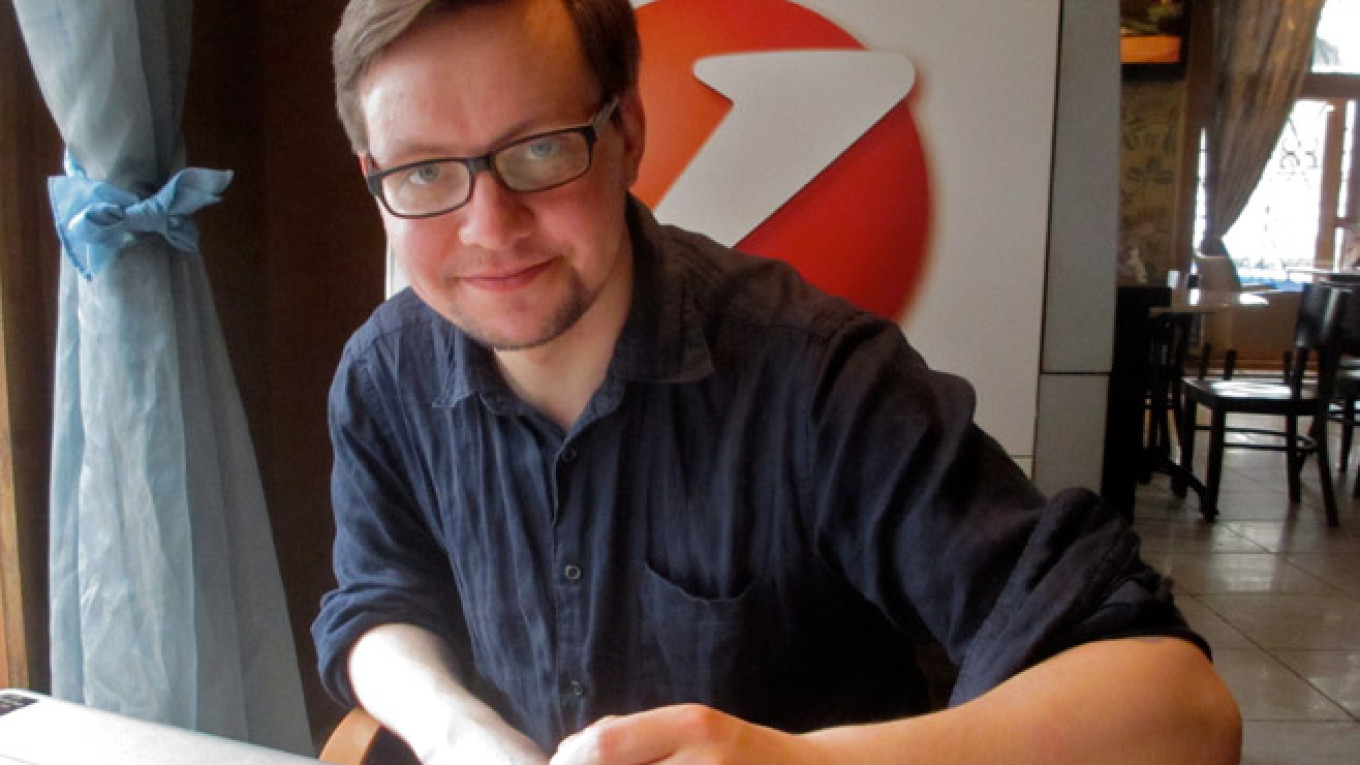It struck me as a sign from above. I was waiting for Dmitry Volkostrelov in a Moscow coffee shop and a television was showing a story about the Spanish painter Antonio Lopez Garcia, whom a crawler text identified as "one of the greatest realists" of the 20th century.
Later, when we got talking, Volkostrelov tossed off a couple of phrases that set alarms going off in my head again.
"Be a realist," he said at one point. "Demand the impossible."
At another juncture in our chat he said, "Theater is an investigation of reality."
Sure, I'm pulling these comments out of context, and I prefer to avoid hyperbole, but I would argue that Volkostrelov, one of Russia's fastest-rising theater directors, has already made a significant contribution to realism in Russian art in the 21st century. His productions in the 2013-2014 season for his own Post Theater in collaboration with the Theater of Nations and the Taganka Theater were, as is customary for him, hyperrealistic. That was especially true of "Three Days in Hell" at the Theater of Nations, where two actors walked back and forth in front of three separate groups of spectators doing virtually nothing while various spoken texts were broadcast over speakers.
That was about as close to a "slice of life" as one can get in the theater.
Don't get me wrong. Volkostrelov is a shrewd, inventive director who has command of all the usual theatrical devices. His production of "1968: Novy Mir" at the Taganka in May was a clever mix of deep-seated realism and whimsical theatrical tricks.
The first scene, entitled "Part One, in which Nothing Happens," depicts actors playing chess, cooking and applying make-up. It was so "realistic" that spectators began to chuckle uncomfortably. Subsequently, however, the theatrical sleights of hand came fast and heavy. My favorite were texts that scrolled down a wall declaring, "Now you will hear a song" by The Doors or the Rolling Stones, although no sounds ensued — only the silence that surrounded the lyrics of each song being projected on the wall.
"1968: Novy Mir" was part of an experiment that the Moscow Culture Committee conducted at the Taganka this year for the theater's 50th anniversary. Several young artists and administrators were given the opportunity to work with the theater as a team, creating productions that sought to identify the contributions this famous playhouse has made to Russian culture over the decades. The project was not welcomed by everyone in the company, but it is commonly accepted that it was huge success artistically.
For Volkostrelov, who was born in Moscow in 1982, the experiment was an "attempt to understand an era, the Taganka. But most interesting, I think, was the experience of working with a team at a repertory theater. That is, being in a theater and trying to establish horizontal lines of communication rather than the vertical line, which is more common for Russian theater."
The director knows well the power of the vertical in Russian theater. He studied under the great Lev Dodin in St. Petersburg and even acted at Dodin's Maly Drama Theater for five years in the master's famous production of "Life and Fate."
"It was very difficult for me to be in the Maly shows," Volkostrelov says of the famous director whose iron grip on his theater is a throwback to traditions originating in the Soviet era. "It was even hard to listen to Dodin speak. I had to find out who I am."
"Yes," he responded to a leading question about whether the best pupils are those who "betray" their mentors, "yes, I killed my teacher."
And yet Dodin also provided his students an important sense of freedom. Volkostrelov quoted his teacher: "Dodin would say, 'No one taught me how to direct and I don't know how to teach it. Those who want to become a director will become one.'"
Volkostrelov did precisely that. He took his first directorial steps in 2010 and by 2011 he founded his own Post Theater in St. Petersburg. He won his first Golden Mask award in 2013 for a show called "Angry Girl," co-produced by Post Theater and the Bryantsev Young Spectator Theater in St. Petersburg.
These days Volkostrelov splits his time between St. Petersburg and Moscow.
"I have no plans to favor one city over another," he says. "Right now I am rehearsing in St. Petersburg and I'll be in Moscow in the fall. The two cities pretty much have become one, and the night train is like a metro to me."
Next up for the director is a production of a play by Pavel Pryazhko called "Parks and Gardens." Produced in St. Petersburg by Post Theater for a late August opening, it will be performed outdoors.
Volkostrelov's next outing in Moscow will be at the Theater of Nations. It will open in early December and will be built around the traditional music of Russian romances.
Contact the author at j.freedman@imedia.ru
A Message from The Moscow Times:
Dear readers,
We are facing unprecedented challenges. Russia's Prosecutor General's Office has designated The Moscow Times as an "undesirable" organization, criminalizing our work and putting our staff at risk of prosecution. This follows our earlier unjust labeling as a "foreign agent."
These actions are direct attempts to silence independent journalism in Russia. The authorities claim our work "discredits the decisions of the Russian leadership." We see things differently: we strive to provide accurate, unbiased reporting on Russia.
We, the journalists of The Moscow Times, refuse to be silenced. But to continue our work, we need your help.
Your support, no matter how small, makes a world of difference. If you can, please support us monthly starting from just $2. It's quick to set up, and every contribution makes a significant impact.
By supporting The Moscow Times, you're defending open, independent journalism in the face of repression. Thank you for standing with us.
Remind me later.


